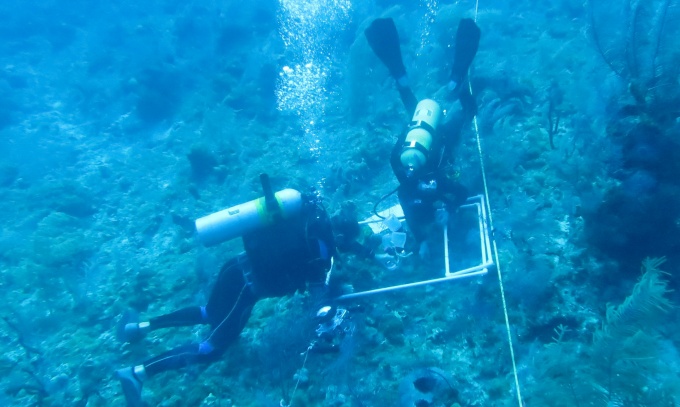Research Areas

Coral reef research in The Bahamas. Courtesy H. Lasker
Our faculty conduct research in fields as various as sustainability, history, the media arts, evolutionary biology, and policy, all focusing on the complex interactions in the environment. Our research merges approaches and techniques from the humanities, and social and biophysical and geophysical sciences. The subject matter embodied by Environment and Sustainability is broad, and encompasses topics such as studies of environmental activism, urban environments, biodiversity over space and time, social systems, climate change, and pollution.
The research conducted through this program impacts communities across the globe and many applied fields, including conservation, restoration, and sustainability.
Our mission is to train students with interdisciplinary competencies in both social and natural sciences, humanities and arts, creative activities, outreach, with both scholarly and applied relevance. EVS faculty give students the opportunity to collaborate with scholars and researchers across many disciplines. Students looking for research opportunities should explore the research areas below and contact the specific faculty member.
Research Areas
Environmental Studies
Sustainability
Faculty engaging in sustainability research pursue interdisciplinary questions and methods centered on achieving a thriving and equitable future. Rooted in the social sciences, while deeply engaged with biophysical processes, such work addresses key questions about the future of conservation, agriculture, infrastructure, water, climate and more.
Social Sciences
Faculty in social sciences disciplines research questions of how humans interact with our environment across temporal and spatial scales. From the Iron Age to the Age of the Internet, the social sciences shed light on sustainability, socio-ecological systems, and human health.
Humanities
Though the sciences are essential in defining environmental issues, a growing number of scholars, policymakers, and sustainability professionals have recognized that scientific understanding alone never is sufficient to address the critical challenges we face today. We also need to understand the cultural, social, economic, political, and psychological forces that help or hurt efforts to deal with environmental problems, especially climate change.
Our faculty have expertise in environmental history and environmental literature. We are especially interested in five key questions. What are the root causes of our environmental problems? Why are some problems harder to solve than others? What shapes the way we think about the human place in nature – and why do people have different views about the environment? How has our relationship to the non-human world changed over time? What can inspire action to build a more sustainable society?
Emily Reisman: Agriculture & Food Systems, Political Ecology, Science & Technology Studies
Adam Rome: Environmental History, Sustainable Economy
Kacey Stewart: Environmental Literature, Environmental Writing
Janet Yang: Science, Health, Environmental and Risk Communication
Environmental Sciences
Ecology
Faculty involved in ecological research study aquatic and terrestrial organisms. Ecological research approaches used by faculty include GIS, Bayesian statistical methods and modelling.
Geosciences
Industrial and domestic pollutants pose a significant threat to ecosystems and humans. Here at UB, environmental chemists research these how contaminants (nanomaterials, flame retardants) function in the ecosystem and their impacts.
Richelle Allen-King: Hydrogeochemistry
Ira Sanford (Sandy) Geffner: Environmental Education, Applied Ecology, Natural History
Nick Henshue: Oligochaetology; Organismal Biology; Restoration Ecology; Soil Ecology; Science Communication; Teacher Education
Scott Mackay: Ecohydrology; Climate Change; Remote Sensing; Geographic Information Systems
Stephanie Poindexter Biological Anthropology; Primate Behavioral Ecology; Conservation
Isabel Porto-Hannes: Freswater Mussel Ecology and Conservation; Aquatic Ecology
Heather Williams: Parasitology, Invasion Ecology
Adam Wilson: Global Change; Biodiversity; Ecosystem Function; Fire, Remote Sensing; Species Distribution Modeling